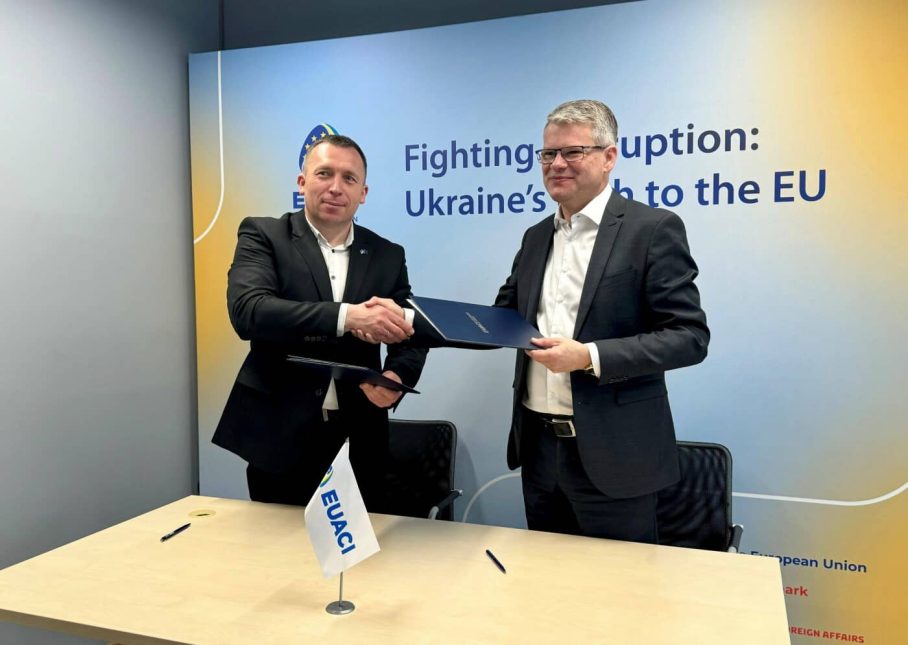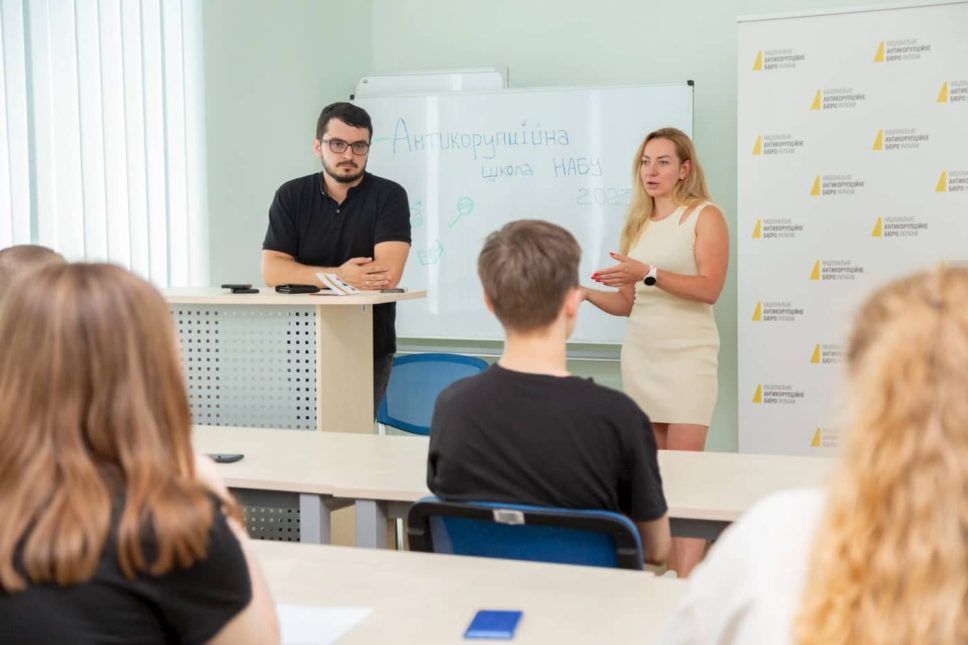
From transparency to accountability: the EU’s role in overcoming corruption in Ukraine
Corruption remains one of the most serious problems in Ukraine, hindering economic development and European integration. In 2023 Ukraine ranked 104th out of 180 countries in the Corruption Perception Index, according to Transparency International Ukraine. This is the best indicator in the last decade, but still quite low. Recognizing the importance of overcoming this problem, the European Union actively supports anti-corruption efforts in Ukraine through implementing various initiatives and programs. How exactly does this happen, and why is the fight against corruption critically important for Ukraine’s integration into the European Union?
EU anti-corruption initiatives in Ukraine: Administrative Service Centres, youth schools, and more
There are many anti-corruption projects and initiatives in Ukraine. The key and largest initiative is the EU Anti-Corruption Initiative, launched in 2017. This programme is funded by the EU and co-financed by Denmark. Its goal is to support anti-corruption reforms and increase the capacity of newly created anti-corruption institutions in Ukraine. The initiative also improves transparency and accountability in the public sector by involving citizens in active participation in anti-corruption processes.
This programme supports key anti-corruption bodies in Ukraine, such as the NABU (National Anti-Corruption Bureau of Ukraine) and the SAPO (Specialized Anti-Corruption Prosecutor’s Office). The EUACI also helped implement anti-corruption tools, including an e-declaration system for civil servants. In cooperation with NABU, EUACI organizes an annual Anti-Corruption School for young people to increase their interest in fighting corruption.
The EU4Justice initiative is also crucial in promoting the reform of the judicial system of Ukraine, increasing its efficiency and autonomy. The implementation of new procedural codes, increasing the transparency of the judicial system, and training for judges and prosecutors are all results of the program.The U-LEAD with Europe programme launched in 2016 is another EU anti-corruption initiative in Ukraine. Its goal is to support decentralization reform aimed at strengthening local self-government and improving the quality of public service delivery. Thanks to this initiative, Administrative Service Centres (ASCs) have opened in Ukraine, which effectively reduce corruption risks at the local level. According to the monitoring of the ASC network, as of the second quarter of 2024, the quality and accessibility of administrative services for citizens are steadily improving.
Civil society at the heart of European integration

The EU pays significant attention to supporting civil society in the fight against corruption. This area includes funding projects of non-governmental organizations and promoting investigative journalism. Such support helps to strengthen public control over the government and increase public awareness of corruption risks. Beneficiaries include organizations such as the Anti-Corruption Action Centre, Automaidan, Reanimation Package of Reforms, StateWatch, Anti-Corruption Headquarters, Transparency International, and others. Usually, the EU provides financial support through grants.
Transparency International and investigative journalists helped expose the “Barn Book” case – the secret accounts of the Party of Regions, which contained information about illegal payments to politicians, judges, officials, and the media for loyalty to Viktor Yanukovych’s regime. In 2017, Transparency International helped the NABU investigate a corruption scheme in the energy sector, where electricity prices were artificially inflated through the “Rotterdam+” formula. This formula included the cost of transporting coal from the port of Rotterdam to Ukraine, even though the coal was actually supplied from within Ukraine. Transparency International also increased the transparency of public procurement, in particular by implementing the ProZorro system.
The Anti-Corruption Action Centre helped expose the case of Maksym Mykytas, a former member of parliament and head of the Ukrbud corporation, who was accused of embezzling state funds during the construction of apartments for the National Guard of Ukraine. According to investigators, the military received apartments on the outskirts of the city instead of housing in the centre of Kyiv, which led to losses of over 81 million hryvnias.
Institutional support: best European practices for Ukraine
Among the main areas of EU support is the creation and development of specialized anti-corruption bodies, such as the National Anti-Corruption Bureau of Ukraine (NABU), the Specialized Anti-Corruption Prosecutor’s Office (SAPO), the National Agency on Corruption Prevention (NACP), and the High Anti-Corruption Court (HACC). The EU provides these institutions with financial support and expertise, assisting in the development of legislation and the implementation of best European practices.
The HACC has become a key element of Ukraine’s anti-corruption infrastructure, playing an important role in the independent consideration of corruption cases in the country. In just 6 years of operation, it has delivered over 160 verdicts. Among the most high-profile cases are the trials against the former judge of the Dniprovskiy District Court, Mykola Chaus, who was sentenced to 10 years in prison with property forfeiture, and the former head of the State Aviation Service, Denys Antoniuk, who was sentenced to 3.5 years in prison. The HACC is currently considering the case of Ukrainian oligarch Ihor Kolomoiskiy, who has been in custody since September 2023.
The EU also supports decentralization in Ukraine, which includes combating corruption at the local level. This involves increasing transparency in decision-making by local governments and creating conditions for citizens to be involved in overseeing these processes.
Fighting corruption as a condition for financial and technical support

In general, the EU links the provision of financial assistance to Ukraine with progress in implementing anti-corruption reforms. This creates an additional incentive for the Ukrainian authorities to continue and deepen anti-corruption efforts.
For example, the European Union launched the Sector Policy Support Programme, which helps implement reforms and fight corruption. It includes Macro-Financial Assistance, under which the EU provides loans to stabilise the economy and support necessary reforms.
Notably, the newly created Ukraine Facility, with a volume of EUR 50 billion, requires the implementation of significant anti-corruption reforms in exchange for financial support, including grants and loans.
Technical assistance is a key component of the EU’s anti-corruption initiatives. It covers training and exchange of experience for employees of Ukrainian anti-corruption bodies, as well as the implementation of electronic systems to increase the transparency of public administration. For example, the EU supported the creation of an electronic system for declaring the income and assets of public servants.
In conclusion, the EU’s anti-corruption initiatives in Ukraine are comprehensive and multidimensional. They cover institutional development, technical assistance, support for civil society, and the creation of incentives for reforms. Although the fight against corruption in Ukraine is still far from over, the support of the European Union plays an important role in moving the country towards more transparent and efficient governance, bringing our country closer to the EU.
Media, Publications
-
Deputy Ambassador of the EU on enlargement, reforms and €190 billion in support
-
EU membership in 2030? Deputy Ambassador of the EU answers students’ questions
-
How does the EU take decisions on Ukraine? Subsidiarity, unanimity and consensus among 27 countries
-
What reforms does Ukraine still need to join the EU? Deputy Ambassador of the EU answers
-
How can Ukrainian students become more involved in EU programmes and projects? Deputy Head of the EU Delegation answers
-
Are there alternatives to European integration if the road to the EU is long? Deputy Ambassador of the EU answers